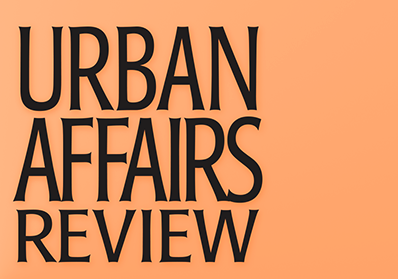
Call for Papers: “The New Urban Crisis”
The Urban Affairs Review is pleased to announce its inaugural graduate student paper competition. In this first year, our theme is the “The New Urban Crisis.” The concept of urban crisis has been explored by scholars since the 1950s and has been deployed to capture myriad city problems from traffic congestion to fiscal deterioration to putative moral decay. In this competition, we encourage authors to examine what might be new about the contemporary challenges facing cities in the U.S. and beyond. Topics may include the impact of budgetary austerity; rising inequality; the targeting of cities by the Trump administration and other authoritarian regimes around the world; climate change; or the intersecting crisis captured by the term, “polycrisis.” Alternatively, researchers might argue that there is no “new urban crisis” at all.

Call for Papers: Urban Politics in the Global South 2025
We are pleased to announce a call for papers for the 2025 Urban Politics in the Global South conference on November 6-7, 2025 (12pm-3pm EST). The conference will be fully virtual. This fourth annual conference brings together the growing community of social scientists conducting research on urban politics in low- and middle-income countries in different world regions. We seek to facilitate exchange among scholars within political science, related disciplines, and practitioners.


UAR Reading List: Gender, Race, and Electoral Politics
Following this weekend’s announcement that President Biden would not seek election, and the all-but-certain nomination of Vice President Kamala Harris secured for the Democratic Party, we assembled a reading list from the UAR archive. These articles address the issues of gender, race, and electoral politics (and their intersections) through the lens of urban studies and draw on a diverse range of methods. As the presidential election approaches, we hope to continue building out this list and solicit new research to examine these themes.

Urban Affairs Review appoints Book Review Editor
Urban Affairs Review recently appointed Dr. Jill Simone Gross as Book Review Editor. The journal is eager to relaunch its book review program as a regular section of the journal. Please share new and upcoming titles with us at our dedicated email address, urbanaffairsbookreviews@gmail.com.


Open Peer Review at UAR
Urban Affairs Review is pleased to announce a new open peer review pilot program! If your article is accepted for publication following our double-blind review process, you will have the opportunity, if you choose, for your peer reviewers to revise and publish their original comments and responses to your article, as a stand-alone commentary (maximum 2,000 words) once the central article is published. You as the author(s) will also have an opportunity to respond to reviewers’ comments in a stand-alone response essay (maximum 2,000 words).

UAR Remixed: A new podcast from Urban Affairs Review
Urban Affairs Review is thrilled to announce the launch of a brand-new companion podcast called “UAR Remixed.” Our first mini-series, “Cityscapes Reimagined: Navigating and Rewiring the Urban,” will launch on September 5th, 2023. In this four-part series, we speak with six scholars working at the intersection of cities and technology. Rather than attempting an exhaustive review of topics like smart cities, data governance, digital surveillance, or counter-mapping, we engage with interdisciplinary researchers to explore their creative and diverse perspectives on these questions.

Digital Symposia are back!
Symposia on the Urban Affairs Review Forum facilitate critical engagement of several scholars around a common theme or question of interest. Typically, each symposium will include between six and twelve short articles of approximately 2,000–4,000 words. Unlike research articles published in the journal, these pieces will not go through the typical peer-review process. Rather, they will be commissioned by one of the UAR’s co-editors who will be responsible for reviewing pieces before publication. These articles are intended to be of interest to fellow scholars but also to reach beyond an academic audience to engage policymakers, practitioners, media outlets, and the general public.

New UAR research article gets public recognition!
Early in June, we published Michelle E. Zuñiga and Michael Méndez’s research article, “The Emergence of Environmental Justice in General Plans: Lessons from California’s Senate Bill 1000.” The abstract summarizes their study of environmental justice-oriented public policy and the challenges facing local communities in garnering political support.
This research has generated media attention in California and nation-wide, and has also been summarized as a three-page policy brief that you can read here.

Student Spotlight: Shervin Ghaem-Maghami
Shervin Ghaem-Maghami (he/him/his) is a Doctoral Candidate in the Department of Geography and Planning at the University of Toronto. He completed a Master of Public Administration at Queen’s University and a Bachelor of Environmental Studies in Urban and Regional Planning at the University of Waterloo. His research centres on the intersection of global migration and community engagement in urban planning processes, especially as it relates to how the integration of newcomers can be facilitated by way of fostering their inclusion in collective decision-making.

Student Spotlight: Mia Mariotti
Mia Mariotti is working towards completing a graduate degree in Urban Strategy from Drexel University, where I am currently studying the modern homesteading movement for my thesis. I'm also a yoga and reiki teacher and spend much of my free time immersed in these practices, as well as running, spending time in the woods, gardening, and cuddled up with a good book.

Student Spotlight: Farwa Zaidi
Farwa Zaidi (she/her/hers) is an Urban Strategy Master’s student at Drexel University. She completed her bachelor’s in Political Science at CUNY Baruch, and has spent many years working in the non-profit sector with the goal of advancing the opportunities of society's most marginalized communities, especially poor, Black, and immigrant women.

Thank You: A Note From the Editors
As we near the end of our tenure as editors of Urban Affairs Review, we want to thank and publicly acknowledge the people who have supported UAR through service on our editorial board between January 2014 and December 2022. We are grateful for your encouragement, advice, and willingness to spend your time helping us produce this journal.

UAR Best Paper Award at APSA 2022
Urban Affairs Review is sponsoring a $250 award given by the the Urban and Local Politics Section for the Best Paper in Urban or Regional Politics presented at the 2022 American Political Science Association conference. We encourage chairs of all Urban and Local Politics Section panels to nominate papers. We also welcome self-nominations. Papers presented on any panel associated with the conference are eligible for this award.

New Journal Impact Scores
2021 UAR Two-Year Journal Impact Factor Released in June 2022 is 2.387

Zane L. Miller Book Development Award
Temple University Press and the editors of the Urban Life, Landscape, and Policy series are pleased to announce the Zane L. Miller Book Development Award, named in honor of our late founding series editor.

Disasters and Economic Shocks Virtual Issue
In advance of the research that will soon be coming forth about the varied impacts of COVID-19 on our lives, UAR Co-Editor Peter Burns has identified several UAR articles that engage issues he thinks will receive a lot of attention from urban scholars. This “virtual” issue on Disasters and Economic Shocks highlights previously published articles on emergency management networks, inequities in public services, public health, immigration policy, and city responses to economic shocks.

2018 Dennis Judd Best Book Award
We wanted to take this opportunity to highlight three important books published last year on urban politics. Michael Craw of Evergreen State College chaired the committee responsible for selecting the recipient of the Dennis Judd Best Book Award given by the Urban and Local Politics Section of the American Political Science Association in August 2019. In this post, he briefly describes the committee’s top three choices for best book published on 2018.

Urban Gathering Addresses Bottom-Up Politics
Partisan polarization and gridlock at the federal level have effectively obstructed the path to positive solutions to the everyday problems of ordinary people. One consequence of this has been a proliferation of local initiatives, many percolating upwards from the very community residents experiencing these problems. To collect, analyze, and advance such "bottom-up" innovations, the Woodrow Wilson Center's Urban Sustainability Laboratory, with the University Seminar on Bottom-Up Politics at the George Washington University and the Metropolitan Policy Center of the School of Public Affairs at American University, held a a symposium on April 12, 2018, in Washington D.C. The symposium grew out of a grant from George Washington University. Under it a team of D.C. area scholars including Clarence Stone, Gregory Squires, Hilary Silver (all from GWU’s faculty), Blair Ruble and Allison Garland of the Wilson Center, and Derek Hyra of American University provided the planning and made the arrangements. Before his failing health forced him to withdraw, the late Thomas Kingsley of the Urban Institute was an integral part of the early planning.